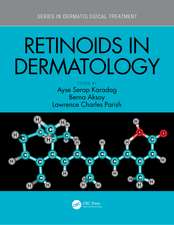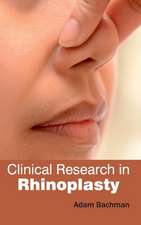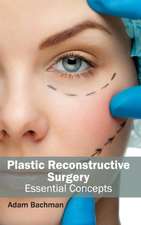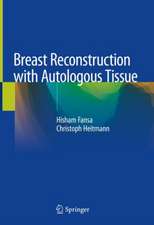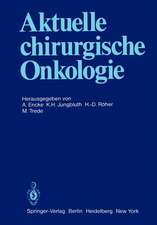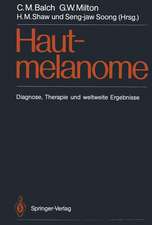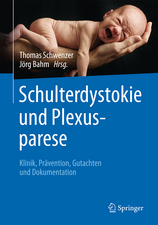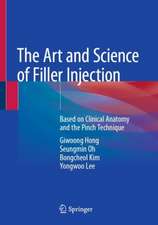Movement Disorders of the Upper Extremities in Children: Conservative and Operative Therapy
Editat de Jörg Bahmen Limba Engleză Paperback – 23 apr 2022
This book discusses the diagnosis and therapy for movement disorders of the upper extremities in children caused by brachial plexus injuries, peripheral nerve lesions or spasticity. The diagnostic procedures are presented from the perspective of pediatricians and surgeons. In addition to detailed descriptions of primary reconstructive and secondary surgical procedures, it also presents essentials of non operative treatment, such as physiotherapy, occupational therapy and orthopedic technologies. The book is rounded out with information on the management of these patients and their parents.
Written by experienced clinicians, it offers valuable reading for plastic surgeons, pediatricians and surgeons who are interested in this topic.
| Toate formatele și edițiile | Preț | Express |
|---|---|---|
| Paperback (1) | 663.21 lei 38-44 zile | |
| Springer International Publishing – 23 apr 2022 | 663.21 lei 38-44 zile | |
| Hardback (1) | 1050.91 lei 3-5 săpt. | |
| Springer International Publishing – 22 apr 2021 | 1050.91 lei 3-5 săpt. |
Preț: 663.21 lei
Preț vechi: 698.11 lei
-5% Nou
Puncte Express: 995
Preț estimativ în valută:
126.90€ • 132.85$ • 105.01£
126.90€ • 132.85$ • 105.01£
Carte tipărită la comandă
Livrare economică 01-07 aprilie
Preluare comenzi: 021 569.72.76
Specificații
ISBN-13: 9783030536244
ISBN-10: 3030536246
Pagini: 344
Ilustrații: XV, 344 p.
Dimensiuni: 178 x 254 mm
Ediția:1st ed. 2021
Editura: Springer International Publishing
Colecția Springer
Locul publicării:Cham, Switzerland
ISBN-10: 3030536246
Pagini: 344
Ilustrații: XV, 344 p.
Dimensiuni: 178 x 254 mm
Ediția:1st ed. 2021
Editura: Springer International Publishing
Colecția Springer
Locul publicării:Cham, Switzerland
Cuprins
Preface.- Part 1. Introduction.- 1. Introduction.- 2. History of Reconstructive Operations.- 3. Obstetric risk factors.- Part 2. Diagnostics.- 4. Diagnostics and therapy planning from the perspective of the neuropaediatrician.- 5. Surgical diagnostic and measurement procedures.- 6. Objective acquisition of pathological movement patterns of the upper extremity: muscular coordination and movement analysis.- 7. "Invasive" diagnostic procedures: Electromyography, Neurography and Evoked Potentials.- 8. Central neural plasticity.- Part 3. Conservative Treatment Methods.- 9. Physiotherapy.- 10. Occupational therapy for children and adolescents.- 11. Orthopaedic Technology.- 12. Botulinum Toxin.- 13. Self-concept.- 14. Inclusion.- Part 4. Primarily reconstructive interventions.- 15. Reconstruction of traumatized nerves.- 16. Neuroorthopaedic management of congenital joint stiffness and muscle spasticity.- 17. Neurosurgical Options.- 18. Rare clinical features.- 19. Anaesthesia in infants and young children with birth traumatic plexus lesion.- Part 5. Secondary interventions.- 20. Principles of orthopaedic correction.- 21. secondary reconstructive surgery.- 22. Non neural microsurgery in children.- 23. Secondary Microsurgery.- Part 6. Follow-up Treatment.- 24. Specific post-operative treatment.- 25. Research on peripheral nerves and muscles.- Part 7. The non-medical concern.- 26. Three testimonials on obstetric brachial plexus palsy.- 27. At home and at school.- 28. Professional life and sports.- 29. Legal Benefits for the severely disabled - the process for filing an eligibility claim with the pension and benefits office.- Part 8. Forensic and legal issues.- 30. Legal Issues and Forensic Problems in Obstetrical Brachial Plexus Paresis.- 31. The role of the reconstructive surgeon in medico-legal practice.- Index.
Notă biografică
Dr. Bahm received his medical degree in 1987 and completed his surgical training in France and Belgium. He trained in hand surgery in Lille, Strasbourg and Paris. He finished his surgical training in 1995 at the University Hospital Aachen, Germany and was an assistant physician in plastic and reconstructive surgery at the University Hospital Aachen, Germany, from 1994 to 1999. Dr. Bahm received his degree in plastic surgery in 1998 and in hand surgery in 2001. From 2000 to 2019, he has been head of the Unit for Reconstructive Microsurgery at the Franziskus Hospital in Aachen, Germany. Since 2004, he also works as consultant for peripheral nerve surgery at the department for orthopaedics and traumatology at the ULB University Hospital in Brussels, Belgium. In 2011, he achieved his medical PhD degree at the ULB University of Brussels, Belgium. Since 2020, he directs the section for plexus surgery of the department for plastic, hand and burn surgery at the University Hospital Aachen, Germany.
His interests are reconstructive plastic surgery in children, in particular brachial plexus lesions. Dr. Bahm is member of the German Society of Plastic, Reconstructive and Aesthetic Surgeons (DGPRÄC) and the German Society of Hand Surgeons (DHG). He has been president of the Belgian Society of Hand Surgeons (BHG) in 2012 and 2013. He has authored or co-authored more than 50 scientific publications in journals.
His interests are reconstructive plastic surgery in children, in particular brachial plexus lesions. Dr. Bahm is member of the German Society of Plastic, Reconstructive and Aesthetic Surgeons (DGPRÄC) and the German Society of Hand Surgeons (DHG). He has been president of the Belgian Society of Hand Surgeons (BHG) in 2012 and 2013. He has authored or co-authored more than 50 scientific publications in journals.
Textul de pe ultima copertă
This book discusses the diagnosis and therapy for movement disorders of the upper extremities in children caused by brachial plexus injuries, peripheral nerve lesions or spasticity. The diagnostic procedures are presented from the perspective of pediatricians and surgeons. In addition to detailed descriptions of primary reconstructive and secondary surgical procedures, it also presents essentials of non operative treatment, such as physiotherapy, occupational therapy and orthopedic technologies. The book is rounded out with information on the management of these patients and their parents.
Written by experienced clinicians, it offers valuable reading for plastic surgeons, pediatricians and surgeons who are interested in this topic.
Caracteristici
Discusses primary reconstructive surgery (nerve reconstruction) and secondary surgery (tendon and muscle transfers) Presents conservative treatment methods: physiotherapy, occupational therapy, orthoses Offers accompanying patient videos before and after surgery


